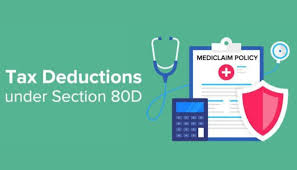Health insurance not only provides financial security during medical emergencies but also offers significant tax benefits under Section 80D of the Income Tax Act. In this guide, we delve into every detail of how you can maximize your tax savings while ensuring comprehensive health coverage for you and your family.
Understanding Section 80D of the Income Tax Act
Section 80D allows individuals and Hindu Undivided Families (HUFs) to claim tax deductions on premiums paid for health insurance policies. These benefits extend to policies covering self, spouse, dependent children, and even parents. The deduction limit varies based on the age of the insured individuals and the nature of their dependency.
Key Highlights of Section 80D
- Eligible Expenses: Premiums paid for health insurance policies and preventive health check-ups.
- Coverage: Deduction is available for self, spouse, children, and parents.
- Additional Deduction for Senior Citizens: A higher deduction is allowed if the insured person or their parents are senior citizens (above 60 years of age).
Maximum Deduction Limits under Section 80D
The deductions under Section 80D are structured based on the age and the relationships of the insured individuals. Here’s a breakdown of the limits:
| Category | Maximum Deduction (₹) |
|---|---|
| Self, spouse, and dependent children (below 60 years) | ₹25,000 |
| Parents (below 60 years) | ₹25,000 |
| Parents (above 60 years) | ₹50,000 |
| Self, spouse, children + senior citizen parents | ₹75,000 |
| Self (above 60 years) + senior citizen parents | ₹1,00,000 |
Preventive Health Check-up Deduction
Section 80D also permits an additional deduction of ₹5,000 towards preventive health check-ups, which is included in the overall deduction limit. This amount can be claimed for health check-ups for self, spouse, dependent children, and parents.
Tax Benefits for Health Insurance Premiums Paid for Senior Citizens
As healthcare costs rise with age, senior citizens are eligible for higher deductions. If you are paying premiums for health insurance for parents above the age of 60, you can claim a deduction of ₹50,000, even if they are not financially dependent on you. Additionally, if you or your spouse is above 60, you can avail a combined deduction of ₹1,00,000.
Super Senior Citizens Without Insurance
In cases where super senior citizens (aged 80 years and above) do not have health insurance coverage, you can still claim a deduction of ₹50,000 for any medical expenses incurred on their behalf.
Family Floater Plans and Section 80D
Family floater policies, which cover multiple members under a single premium, are also eligible for tax deductions under Section 80D. The maximum deduction is the same as for individual policies, depending on the ages of the insured members.
Deductions for Health Insurance of Non-Resident Indians (NRIs)
NRIs are also eligible to claim deductions under Section 80D. However, the benefits are limited to the premiums paid for themselves, their spouse, and dependent children. NRIs cannot claim deductions for premiums paid for their parents.
Breakdown of Health Insurance Tax Benefits for Different Scenarios
Scenario 1: Individual Below 60 Years, Parents Below 60 Years
- Deduction for self, spouse, and children: ₹25,000
- Deduction for parents: ₹25,000
- Total Deduction: ₹50,000
Scenario 2: Individual Below 60 Years, Parents Above 60 Years
- Deduction for self, spouse, and children: ₹25,000
- Deduction for senior citizen parents: ₹50,000
- Total Deduction: ₹75,000
Scenario 3: Individual Above 60 Years, Parents Above 60 Years
- Deduction for self, spouse, and children: ₹50,000
- Deduction for senior citizen parents: ₹50,000
- Total Deduction: ₹1,00,000
Section 80D and Medical Insurance for HUFs
Health insurance premiums paid by a Hindu Undivided Family (HUF) for members of the family are eligible for deductions under Section 80D. The limit for deduction is ₹25,000 for family members below 60 years and ₹50,000 for senior citizen family members.
Claiming Tax Deductions for Preventive Health Check-ups
Preventive health check-ups are essential for early diagnosis and management of health issues. Under Section 80D, you can claim up to ₹5,000 for expenses incurred on preventive health check-ups. This benefit is included within the overall limit of ₹25,000 or ₹50,000, as applicable.
Example: If you pay a total premium of ₹22,000 for your family’s health insurance and spend ₹3,000 on preventive health check-ups, you can claim a total deduction of ₹25,000.
How to Maximize Tax Savings Under Section 80D
To optimize the tax benefits under Section 80D, consider the following strategies:
- Invest in a Family Floater Plan: A family floater health insurance policy allows you to cover your entire family under a single plan, potentially offering a higher sum insured and more convenience while maximizing your tax savings.
- Cover Parents: If your parents are above 60 years, paying for their health insurance can help you claim the higher deduction of ₹50,000 for their coverage.
- Preventive Health Check-ups: Utilize the additional ₹5,000 deduction available for preventive health check-ups, which can be claimed even if no premium is paid in that financial year.
How to File a Claim for Section 80D Deduction
Filing for deductions under Section 80D is a simple process:
- Premium Payment Proof: Ensure you have receipts or bank statements showing the health insurance premium payments made during the financial year.
- Claim Deduction at the Time of ITR Filing: During the filing of your Income Tax Return (ITR), declare the amount paid for health insurance premiums under the ‘Deductions’ section.
- Preventive Health Check-ups: Keep receipts for any preventive health check-ups to claim the ₹5,000 deduction.
Conclusion
Health insurance not only provides financial protection but also offers significant tax benefits under Section 80D. By understanding the various deduction limits and scenarios, you can effectively reduce your taxable income while securing your family’s health. Always ensure that you maintain proper documentation and fully utilize all available deductions to maximize your tax savings.
Related Blogs:
1. https://mediupdates.com/2024/10/common-myths-and-misconceptions-about-family-floater-health-insurance.html
2. https://guest-post.org/health-insurance-with-pregnancy-coverage/
3. https://tumblrblog.com/how-to-compare-senior-citizen-health-insurance-plans-a-step-by-step-guide/
4. https://virtualnewsfit.com/top-10-benefits-of-having-foreign-travel-health-insurance/
5. https://websarticle.com/top-5-common-travel-insurance-claims-and-how-to-avoid-them/
6. https://motoreview.net/2024/10/10/travel-health-insurance-covered-vs-not/
7. https://itflexnews.com/how-to-file-a-travel-insurance-claim-a-step-by-step-guide/
8. https://www.latestbusinessnew.com/benefits-of-getting-abroad-travel-insurance-vs-agencies/
9. https://icacedu.com/top-five-benefits-of-renewing-a-bike-insurance-online-quick-and-easy/
10. https://populerpost.com/compare-motorcycle-insurance-plans-online-for-renewal/
11. https://technonetwork.co.in/toyota-insurance-coverage/
















